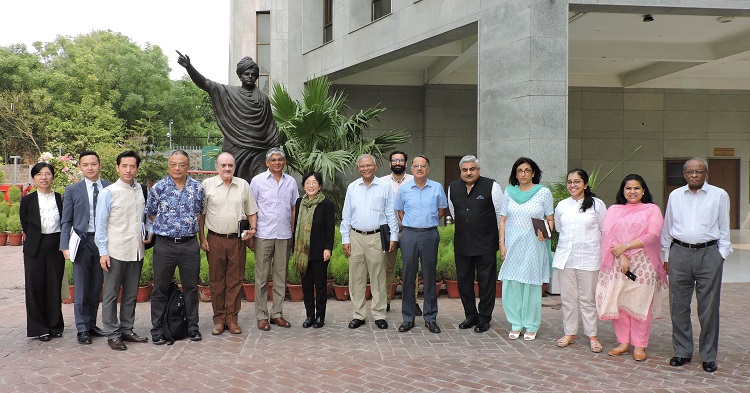The Vivekananda International Foundation (VIF) hosted a Chinese delegation led by Amb. Yang Yanyi, (Former Head of the Chinese Mission to the European Union). She was accompanied by Mr Zhu Feng, Executive Director of China Center for Collaborative Studies of the South China Sea, Nanjing University, Mr Luo Yi, Deputy Division Director, the Department of Asian Affairs of Ministry of Foreign Affairs (MFA) and Ms Chen Xiaoli, Second Secretary, the Department of Policy Planning of MFA. Lt Gen Ravi Sawhney presided over the interaction.
Amb. Yang Yanyi gave a briefing on the Chinese perspective on the US-China trade friction. She pointed o highlighted that the international order is going through a rapid change. In this new scenario, the US-led America first policy, unilateralism and protectionist were cause of major concern, she argued. The US is the biggest beneficiary of the trade that is supposed to be mutually beneficiary. On the issue of the Intellectual Property Right (IPR), the US is complaining about IPR theft. She argued that these claims are baseless and instead the trade between the US and China has increased. In 2018 the trading goods, between both the sides was USD 630 billion that is 258 fold increase. Additionally, the US is China’s biggest market.

Ms Yanyi raised four points to validate her argument. Firstly, the progress China has made in science and technology is because of the large investment it has made in science education, innovation, research and development over the years. The advancement in science and technology was due to the hard work of the successive Chinese generations. There is no forced transfer against the wishes of the American partner. Secondly, the domestic structural economic factors of the US are the root causes of the American ills. The America industrialists are generating huge profits but not sharing with others. The current administration in the US is taking the short-cut method by blaming others and not going for self-introspection. Thirdly, the consequence of ‘America first’ and unilateralism are dire. Fourthly, US withdrawal from Trans-Pacific Partnership, climate change and the travel ban coupled with the ferocious attack on global companies such as Huawei is dangerous. This is symptomatic of the US ambition. She raised the issue of the world order and stated that the crux of the issue was the kind of world order for which the countries stand for. She added that the present international order has been a source of hope and China will support a rule-based order. Amb. Yanyi was hopeful about the resumption of talks between the interlocutors.
On the US-China trade friction, the delegation further explained that the US was using China as a scapegoat. The US has a habit of switching sides and this is the real nature of world politics. They have used China as scapegoat as a result of which Donald Trump’s rating has increased. The Chinese delegation proposed that the US should aim at co-development. The delegation reiterated that in the US domestically the wealth goes to the one per cent of the population. It is a rich economy but not a fair one. There is no equality of distribution in the US. Donald Trump is using this opportunity to divert attention. For big powers like the US, the real competition is not China but their own domestic situation. The delegation pointed out that the US has failed to deliver on the good governance issues.
The briefing was followed by a much discussion. The salient points of the discussion were as follows:-
- If the on-going trade friction continues, it will lead to a cold war situation. In this scenario, China is cautiously optimistic. The delegation pointed out that the China-US relations have never been as complicated as ever before.
- Global value chains are increasingly important in international trade. The breakup of goods and services production between different companies often operating in different parts of the world create the Global Value Chain and it is very hard to abolish this system. The US companies are also affected adversely in the Global Value Chain due to the trade friction.
- The Chinese delegates stated that there were people in high places in the US that are doing decoupling. China never believes in ‘Thucydides Trap’, instead China is a champion of multilateralism. The best way to avoid the trap is to open a new path. The US was using a very old path/ format, they argued.
- Further, the delegation expounded on the connectivity projects that China is pursuing. BRI has put to bridge the gap of East and West China, later on to the integration and connectivity.
- The issue of China–European Union (EU) relations were also discussed. There strategic interest of both the relations is totally different. The US is a distant partner in the relations and wherever there is a chance they will leave and go away. But for the EU multilateralism is the lifeline. Although the EU has a difference in ideology, they realize that China is a huge market and have taken have taken cognizance of the fact that China has focused on movement on quality and not speed, the Chinese delegates argued.
- To sum up, the Chinese delegation reiterated that China stands for a mutually focused forward-looking and mutually beneficial solution to the trade friction.






Post new comment